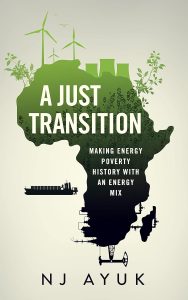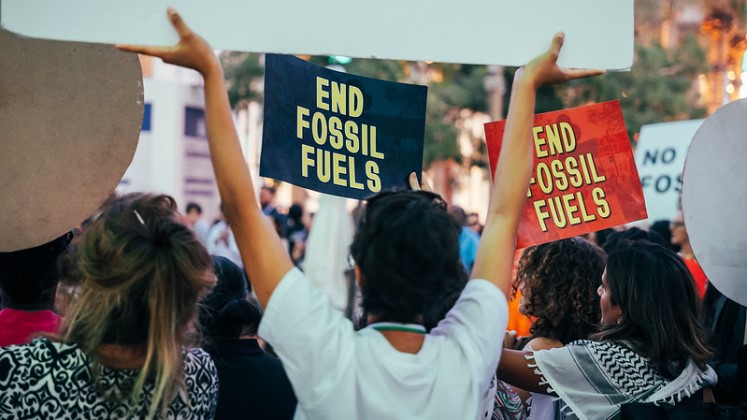 In A Just Transition: Making Energy Poverty History with an Energy Mix, NJ Ayuk argues that Africa can address “energy poverty” and become a global energy leader by developing a mix of non-renewable and green projects. Alejandra Padín-Dujon is unconvinced by Ayuk’s proposal of a “just transition” for African countries which relies on scaling up fossil fuels and lacks any real engagement with renewable energy or climate-focused policy.
In A Just Transition: Making Energy Poverty History with an Energy Mix, NJ Ayuk argues that Africa can address “energy poverty” and become a global energy leader by developing a mix of non-renewable and green projects. Alejandra Padín-Dujon is unconvinced by Ayuk’s proposal of a “just transition” for African countries which relies on scaling up fossil fuels and lacks any real engagement with renewable energy or climate-focused policy.
A Just Transition: Making Energy Poverty History with an Energy Mix. NJ Ayuk. Made for Success. 2023.
 In 2021, the International Energy Agency stated that there should be “no new investment in fossil fuel supply projects” if containing global warming to 1.5ºC above preindustrial levels – a crucial threshold for human welfare – is to remain a possibility. With greenhouse gas-reducing initiatives on the rise, the concept of “just transition” has become increasingly prominent. “Just transition” refers to the greening of markets in economically inclusive ways, taking climate action while ensuring that vulnerable people are not left behind.
In 2021, the International Energy Agency stated that there should be “no new investment in fossil fuel supply projects” if containing global warming to 1.5ºC above preindustrial levels – a crucial threshold for human welfare – is to remain a possibility. With greenhouse gas-reducing initiatives on the rise, the concept of “just transition” has become increasingly prominent. “Just transition” refers to the greening of markets in economically inclusive ways, taking climate action while ensuring that vulnerable people are not left behind.
One might be forgiven, then, for assuming that Cameroonian oil and gas attorney NJ Ayuk’s book A Just Transition: Making Energy Poverty History with Natural Resources – grounded in Africa – would reckon with socioeconomically inclusive energy decarbonisation in Africa. It does not. This glaring omission is especially disappointing given the book’s potential to address a dearth of literature on just energy transitions in African countries. Ultimately, Ayuk’s work capitalises on public interest in this knowledge gap, though he does very little to bridge it.
In A Just Transition, Ayuk touts the importance of encouraging and scaling up fossil fuel extraction and use.
In A Just Transition, Ayuk touts the importance of encouraging and scaling up fossil fuel extraction and use. He expresses trepidation about renewable energy while he pays lip service to climate priorities. He likens renewable energy in Africa – often tenuously – to failures of foreign food aid and continued energy poverty. Ayuk writes that one day,
African countries will be in a position to install more and more solar panels and wind turbines—not as primary sources of power or as alternatives to fossil fuels, but as complements to the gas-burning TPPs [thermal power plants] that make sure the lights can always stay on” [emphasis added].
Strikingly, inconsistently, and more sensibly (given the title), Ayuk writes in an earlier chapter that “Africa ought to develop its gas reserves, but with the goal of replacing gas with renewable energy in stages.”
Perhaps a better title for the book might have been Generally Against Transition – but alas.
Very little of A Just Transition is dedicated to renewable energy at all: the text is primarily an apologia claiming that oil and gas will deliver Africa from energy poverty.
Very little of A Just Transition is dedicated to renewable energy at all: the text is primarily an apologia claiming that oil and gas will deliver Africa from energy poverty. In fact, only one short chapter out of 23 in total sets aside this fixation to address arguments for and against (read: against) the rapid development of renewables in Africa.
As this section of the book is the most pertinent to the question of interest – just energy transition in Africa – let us touch upon Ayuk’s major claims about renewable energy:
- Renewables will fail to address energy poverty.
- Renewable energy projects cost more than most African countries can pay, both in terms of upfront costs and subsidies thereafter.
- Renewable energy infrastructure requires more technological capacity than the continent currently has.
- As intermittent energy sources, solar and wind power require expensive battery storage solutions.
(As a “bonus” claim: Ayuk affirms that green hydrogen is the best alternative energy. He neglects to explain clearly that hydrogen is only classified as “green” if zero-carbon renewables and nothing else are used to synthesise it – making the development of green hydrogen entirely dependent on the development of wind power, solar power, etc.)
None of these are especially new arguments, whether for countries in Africa or for developing countries in other regions that feel squeezed by dual pressures to develop economically and decarbonise – all with minimal financial support from wealthier countries
Mostly, Ayuk’s reservations are policy and technological questions: how can foreign actors, domestic policy, and public-private partnerships reduce the upfront costs of renewable energy projects and help ensure proper maintenance?
Mostly, Ayuk’s reservations are policy and technological questions: how can foreign actors, domestic policy, and public-private partnerships reduce the upfront costs of renewable energy projects and help ensure proper maintenance? What forms of capacity-building are needed in domestic workforces to facilitate the rise of “future-proof” jobs? How can World Trade Organization intellectual property rights policies be reformed to facilitate greater tech transfer to Africa? These are big, but not intractable problems.
The biggest outstanding question is a speculative and slippery one: can renewable energy address severe and widespread energy poverty on the continent?
The major intervention Ayuk considers – and dismisses – is decentralised energy “mini-grids” or “micro-grids” powered by wind or sun, which he claims are too expensive to install and too inconsistently upkept. These are real issues, and they can be addressed through microfinance, investment by regional development banks, government subsidies, and innovative policy solutions.
Truthfully, the question of whether renewables can end energy poverty in Africa is a false one. Posing it as an if question – particularly when the African continent is systemically under-researched and suffers from significant gaps in data collection – is a deft rhetorical move that permits the response, “We can’t bet on it because we don’t have the evidence.” Certainly, evidence supporting the potential developmental contributions of fossil fuels abounds, even when the benefits percolate inequitably through society. 250 years have passed since the inception of fossil fuel-driven development: the Industrial Revolution. That is a lot of evidence.
Ultimately, the “question” of renewables in Africa must be posed not through the lens of if or when, but how.
Ultimately, the “question” of renewables in Africa must be posed not through the lens of if or when, but how. Indisputably, Africa emits very little in greenhouse gases – a nearly negligible amount in the context of global output. However, rapid population growth and ongoing economic development mean that investment in fossil fuels in the region could become globally significant.
The COP28 international climate conference this year will feature another showdown of epic proportions surrounding the terms fossil fuel “phase-out” versus “phase-down.” “Phase-in” isn’t part of the global vocabulary.
More importantly from a regional economic development perspective, the world is decarbonising, and fast. Already, the EU is imposing tariffs called “carbon border adjustment mechanisms” on imports from countries with high carbon intensity to protect its own green policies from decay. The International Energy Agency, as cited above, is calling for a total end to new fossil fuel extraction. The COP28 international climate conference this year will feature another showdown of epic proportions surrounding the terms fossil fuel “phase-out” versus “phase-down.” “Phase-in” isn’t part of the global vocabulary.
Ayuk prefers to speak in generalities about “Africa,” picking a handful of case studies per chapter to illustrate a broad point about 54 countries. In this way, his rhetoric paints a picture of a continent unified by suffering and neglected business potential.
Neither does the author, by and large, acknowledge that Africa is a vast continent composed of rural, urban, more prosperous, and less prosperous societies, all with different electricity grids, economies, and institutional structures. Ayuk prefers to speak in generalities about “Africa,” picking a handful of case studies per chapter to illustrate a broad point about 54 countries. In this way, his rhetoric paints a picture of a continent unified by suffering and neglected business potential. This is an attractive image to the foreign and well-intentioned businessperson – in fact, A Just Transition topped the Wall Street Journal bestsellers list – though it is antithetical, in its simplistic victimhood, to the anti-colonial framing Ayuk experiments with early on:
I’ve begun to wonder whether there isn’t a whiff of colonialism about the prospect of African countries remaining on hold, pining for solar panels and wind turbines until such time as they are allowed access to solutions handed down from on high.
One would think, to read Ayuk, that Africa is a monolith; that fossil fuels are not regressive, but futuristic; that oil and gas have not historically been colonial ventures; and even that green policy is foreign – that there are no African environmentalists.
What Ayuk fails to acknowledge is that energy poverty must be addressed through renewables
Ultimately, what Ayuk fails to acknowledge is that energy poverty must be addressed through renewables, and stalling will only make future economic sacrifices worse. Any set of countries, however entrepreneurial, that gambles its future on fossil fuels today will lose.
- This review first appeared at LSE Review of Books.
- Image credit: Milieudefensie on Flickr.
- Please read our comments policy before commenting.
- Note: This article gives the views of the reviewer, and not the position of USAPP – American Politics and Policy, nor of the London School of Economics.
- Shortened URL for this post: https://bit.ly/40BOa2X






